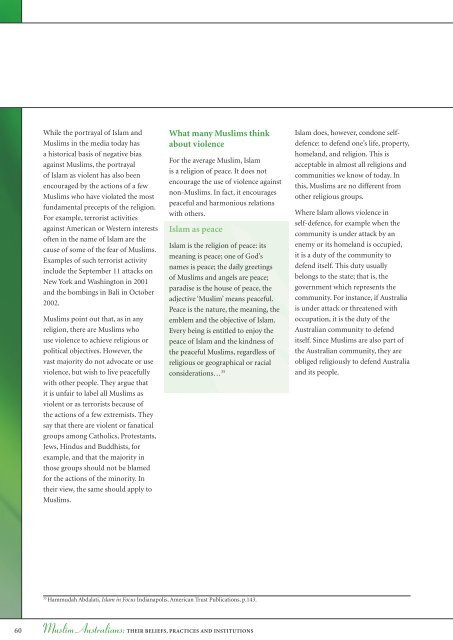Muslim Australians - Religion Cultural Diversity Resource Manual
http://www.islamicglobe.com
http://www.islamicglobe.com
Create successful ePaper yourself
Turn your PDF publications into a flip-book with our unique Google optimized e-Paper software.
While the portrayal of Islam and<br />
<strong>Muslim</strong>s in the media today has<br />
a historical basis of negative bias<br />
against <strong>Muslim</strong>s, the portrayal<br />
of Islam as violent has also been<br />
encouraged by the actions of a few<br />
<strong>Muslim</strong>s who have violated the most<br />
fundamental precepts of the religion.<br />
For example, terrorist activities<br />
against American or Western interests<br />
often in the name of Islam are the<br />
cause of some of the fear of <strong>Muslim</strong>s.<br />
Examples of such terrorist activity<br />
include the September 11 attacks on<br />
New York and Washington in 2001<br />
and the bombings in Bali in October<br />
2002.<br />
<strong>Muslim</strong>s point out that, as in any<br />
religion, there are <strong>Muslim</strong>s who<br />
use violence to achieve religious or<br />
political objectives. However, the<br />
vast majority do not advocate or use<br />
violence, but wish to live peacefully<br />
with other people. They argue that<br />
it is unfair to label all <strong>Muslim</strong>s as<br />
violent or as terrorists because of<br />
the actions of a few extremists. They<br />
say that there are violent or fanatical<br />
groups among Catholics, Protestants,<br />
Jews, Hindus and Buddhists, for<br />
example, and that the majority in<br />
those groups should not be blamed<br />
for the actions of the minority. In<br />
their view, the same should apply to<br />
<strong>Muslim</strong>s.<br />
What many <strong>Muslim</strong>s think<br />
about violence<br />
For the average <strong>Muslim</strong>, Islam<br />
is a religion of peace. It does not<br />
encourage the use of violence against<br />
non-<strong>Muslim</strong>s. In fact, it encourages<br />
peaceful and harmonious relations<br />
with others.<br />
Islam as peace<br />
Islam is the religion of peace: its<br />
meaning is peace; one of God’s<br />
names is peace; the daily greetings<br />
of <strong>Muslim</strong>s and angels are peace;<br />
paradise is the house of peace, the<br />
adjective ‘<strong>Muslim</strong>’ means peaceful.<br />
Peace is the nature, the meaning, the<br />
emblem and the objective of Islam.<br />
Every being is entitled to enjoy the<br />
peace of Islam and the kindness of<br />
the peaceful <strong>Muslim</strong>s, regardless of<br />
religious or geographical or racial<br />
considerations… 35<br />
Islam does, however, condone selfdefence:<br />
to defend one’s life, property,<br />
homeland, and religion. This is<br />
acceptable in almost all religions and<br />
communities we know of today. In<br />
this, <strong>Muslim</strong>s are no different from<br />
other religious groups.<br />
Where Islam allows violence in<br />
self-defence, for example when the<br />
community is under attack by an<br />
enemy or its homeland is occupied,<br />
it is a duty of the community to<br />
defend itself. This duty usually<br />
belongs to the state; that is, the<br />
government which represents the<br />
community. For instance, if Australia<br />
is under attack or threatened with<br />
occupation, it is the duty of the<br />
Australian community to defend<br />
itself. Since <strong>Muslim</strong>s are also part of<br />
the Australian community, they are<br />
obliged religiously to defend Australia<br />
and its people.<br />
35<br />
Hammudah Abdalati, Islam in Focus Indianapolis, American Trust Publications, p.143.<br />
60 <strong>Muslim</strong> <strong>Australians</strong>:THEIR BELIEFS, PRACTICES AND INSTITUTIONS














